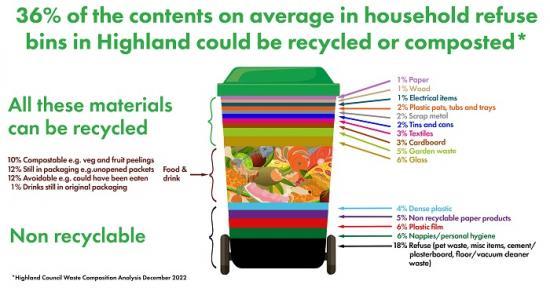Analysis Reveals What Is Thrown Away In Household Bins In Highland
23rd May 2023

Recent analysis shows that that over a third of waste in the average household refuse bin could be recycled or composted at home!
The Highland Council has conducted a Waste Composition Analysis of the waste that householders put in their refuse and recycling bins. Funded by Zero Waste Scotland as part of a national analysis of the waste in household bins across Scotland, the results will enable the Council to focus on waste prevention and increasing recycling.
This Waste Composition Analysis shows that more than a third (36%) of the waste found in the average household refuse bin could be recycled or composted at home. An additional quarter (25%) of the waste found in the refuse bins was food and drink in its packaging or in unopened containers, the majority of which could have been consumed.
The Waste Composition Analysis was carried out in November 2022 using a sample of households in Contin, Evanton, Dingwall, Inverness and Strathpeffer. Varied and representative types of homes were used in the analysis, including flats, local authority housing, suburban and rural housing.
Chair of Highland Council's Communities and Place Committee, Cllr Graham Mackenzie said, "The last Waste Composition Analysis was completed in 2014, so this latest much-needed exercise shows how we are doing with recycling in Highland. The amount of food and drink in refuse bins equates to 20,000 tonnes of waste per year across the region and is disappointing."
He continued: "When we throw food away, it rots and releases methane, a greenhouse gas into the atmosphere. Methane gas has 80 times the warming power of carbon dioxide, a major contributor to the climate crisis."
Only buying the food we know we will eat reduces food waste and saves households money. Composting unavoidable food waste at home such as vegetable peelings and fruit skins is easy to do and helps to reduce to reduce greenhouse emissions. Useful information on reducing food waste, saving money and composting can be found at these links:
Food and Climate Change - Love Food Hate Waste
Easy guide to composting - Zero Waste Scotland
Cllr Mackenzie continued, "The Waste Composition Analysis shows us where we need to make changes in our behaviour towards waste and recycling. Reducing the amount we create is the first step, followed by re-use. Donate usable items such as clothes, books, and toys to charity shops rather than throwing them away. Getting as much recycling out of the refuse bin is the next important step as we all work towards a more sustainable waste solution and the funding from the Scottish Government's Recycling Improvement Fund will certainly help us achieve this when the new refuse and recycling collections are introduced next year."
The Waste Composition Analysis also shows that on average refuse bins also contain glass bottles and jars (6%), garden waste (6%) and metal (4%). All these materials can be recycled at the Council's 200 Recycling Points, 21 Household Waste Recycling Centres or where available through the Garden Waste Collection Service.
The analysis also found 2% of the waste to be plastic pots, tubs, and trays. These are items that are easily recycled in the blue recycling bin and a quick rinse will ensure they do not have food waste on them: good recycling is clean and dry.
Inverness residents are reminded that they have a free, weekly, kerbside food waste collection service. The Council provides free indoor and outdoor caddies plus free liners. Leaflets explaining how to use caddies are also supplied. If you live in Inverness and would like to start using the Service or have lost your caddy, please apply online www.highland.gov.uk/foodwaste
The Council collects around 57,000 tonnes of refuse and around 15,000 tonnes of recycling from households through kerbside collections each year. The recycling rate for Highland is 37%. This includes recycling from the kerbside and Household Waste Recycling Centres.
Over the coming months the Council will be communicating with residents, highlighting the part we can all play in reducing the amount of waste in refuse bins and increasing recycling along with full details of the planned changes to waste and recycling collections which will be introduced in phases from April 2024.
For tips on how to reduce your waste or for more information about recycling please visit www.highland.gov.uk/recycle or email recycle@highland.gov.uk
Related Businesses
Related Articles
